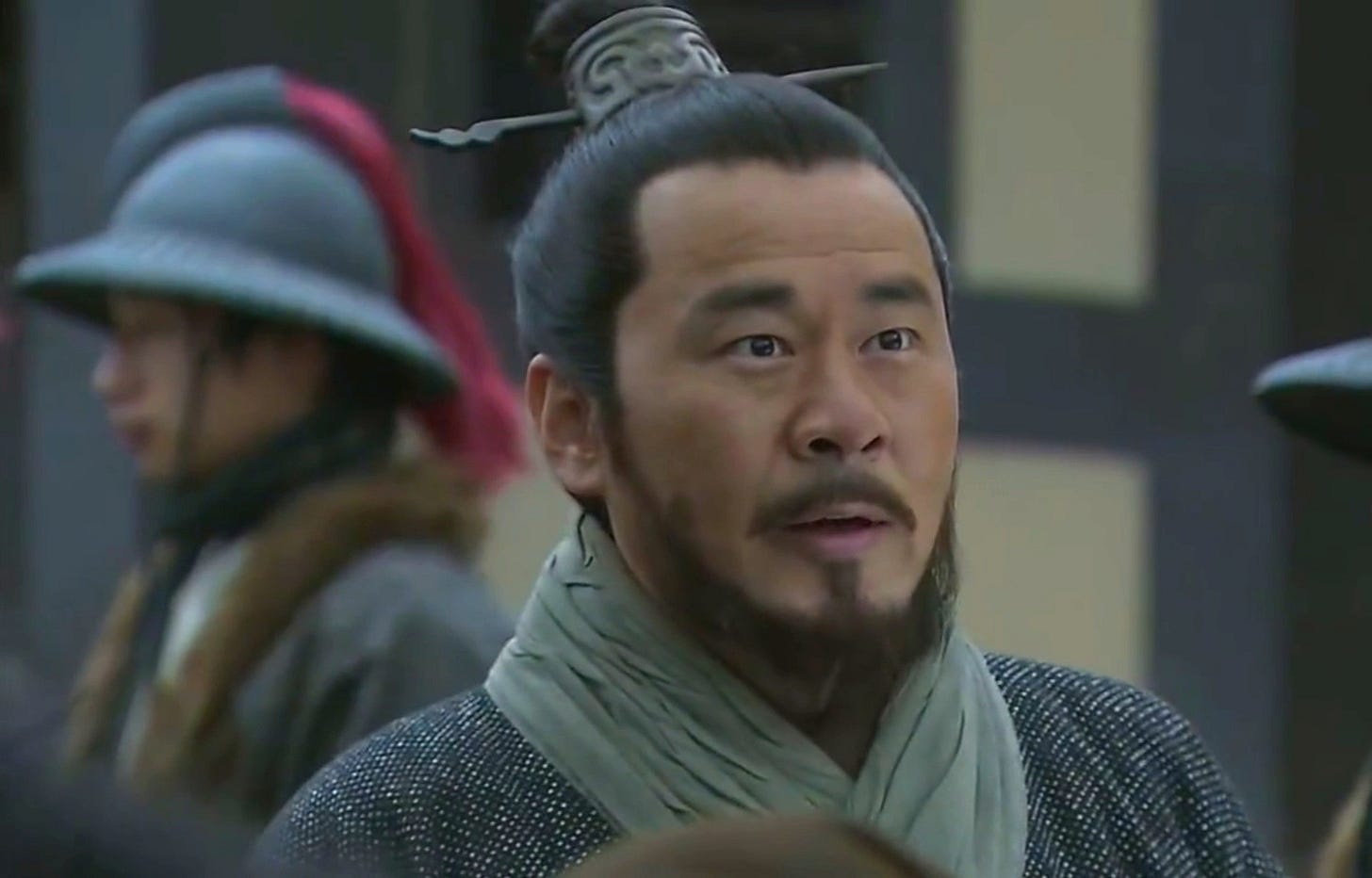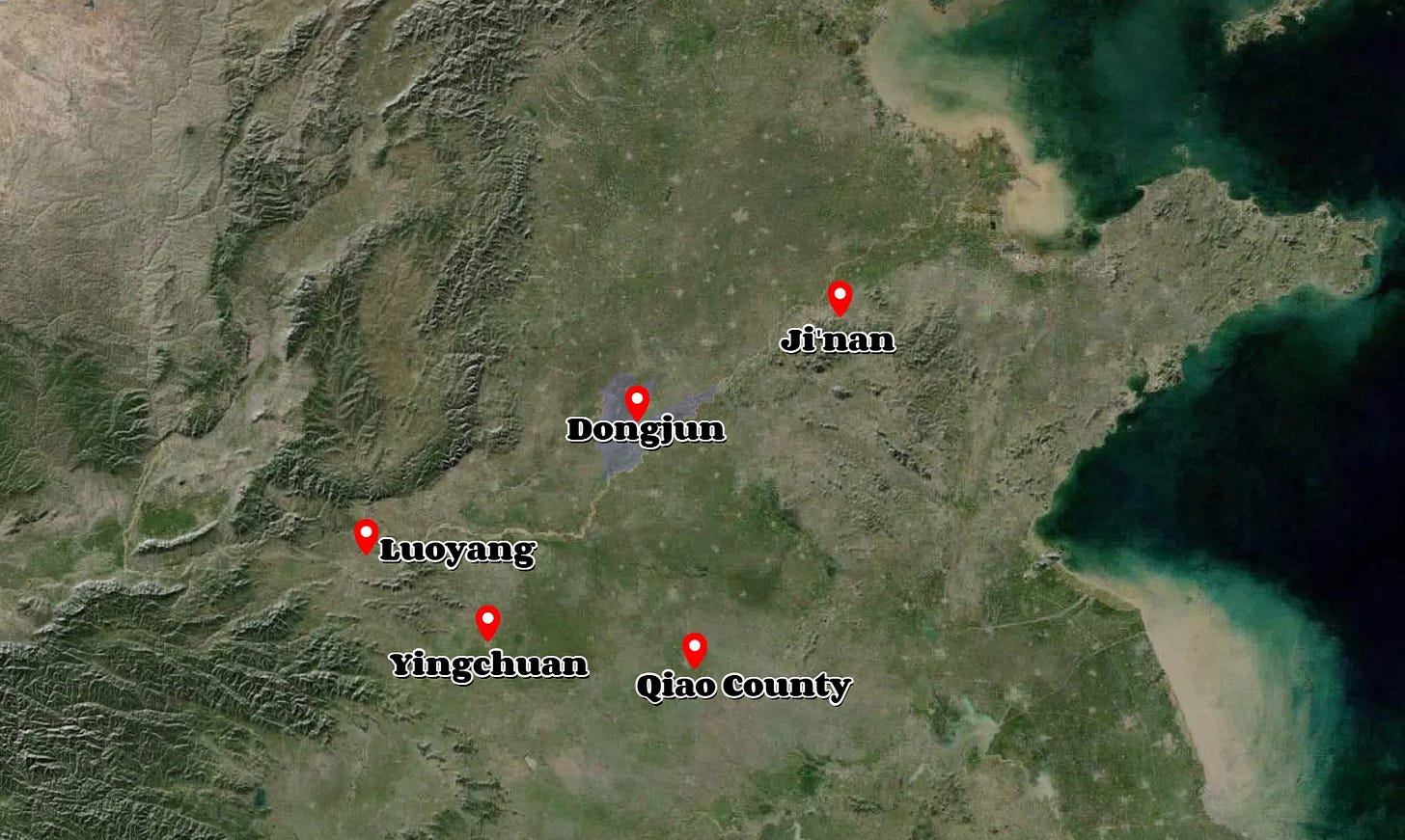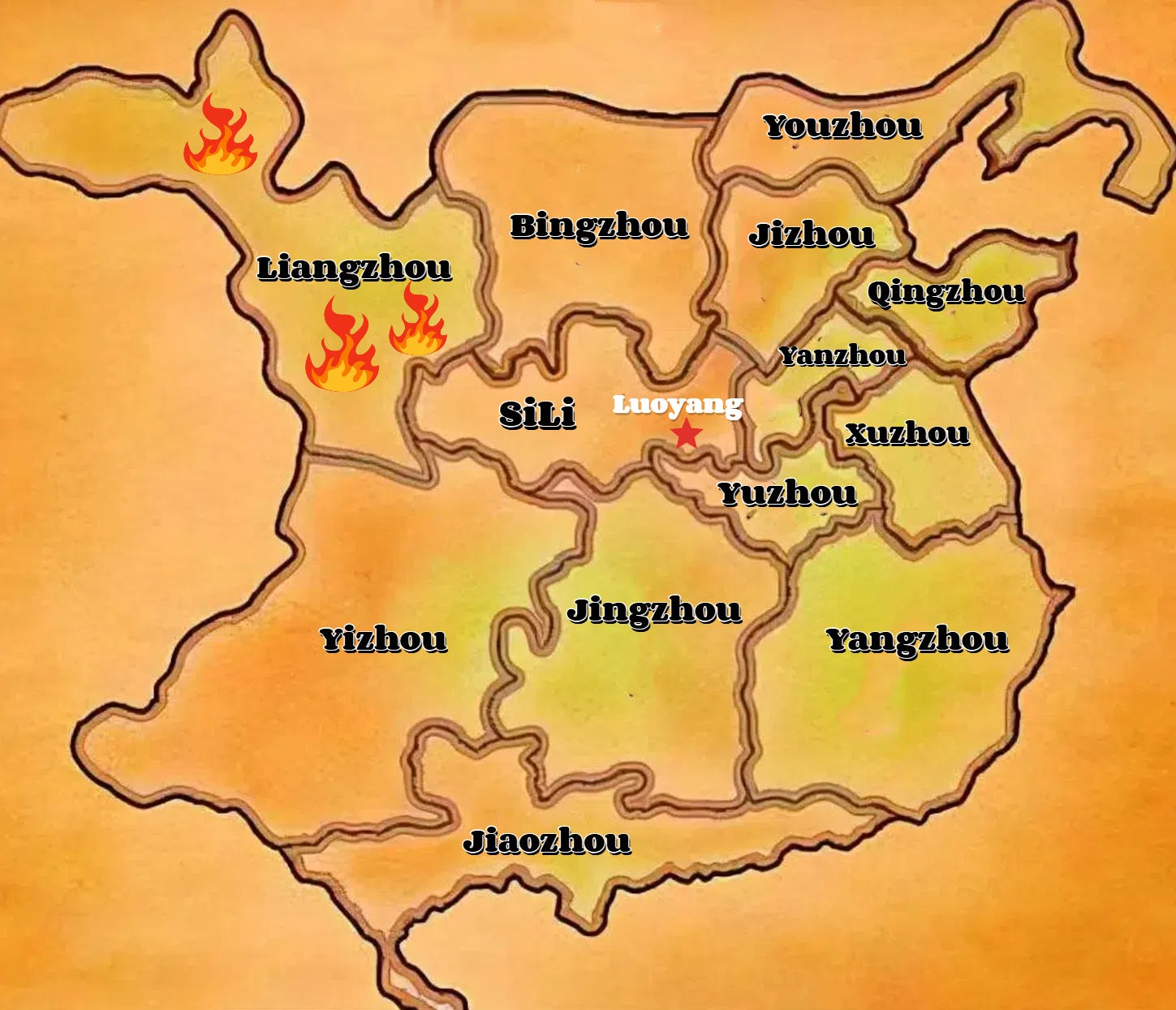The Legend of Cao Cao,a Righteous and Rebellious Youth
History of Three Kingdoms 116(Special Chapter - Review of Cao Cao's Life 1)
Cao Cao died at the age of 66 on the 23rd day of the first lunar month in 220 AD in Luoyang.
Cao Cao's life was a life of hardship, struggle, and greatness.
He was born in a family that is very rich but the status is not honorable, because his father,Cao Song曹嵩, is a adopted son of a eunuch. But no one can explain his specific origin, even his original family name should be Cao曹 or Xiahou夏侯, there are also many different opinions.
Although in his youth Cao Cao had a sharp wit and was rich in power and strategy, his character was dissolute and uninhibited, preferring to be chivalrous and not focusing on cultivating himself and his studies.
He used to ride around hunting with an eagle and a dog, be away from home for days. He and Yuan Shao袁绍, later his arch-enemy, had also been close friends in their youth. They once went together to steal someone's bride, and in the heat of the moment, he even sneaked into the house of Zhang Rang张让, a leader of the eunuchs, when he was discovered, he waved his hand halberd, fought off the guards, and escaped over the wall.
Although Cao Cao was unruly at this time, his father, Cao Song, was the commandant of SiLi(司隶校尉in charge of the commanderies around the capital), a position of great power that no one dared to mess with. So by relying on his father's protection, Cao Cao was able to enjoy his teenage years.
Although Cao Cao's family was very wealthy and his father was a high-ranking official, he was often despised by other people from bureaucratic families or famous scholars. Yeah, his grandfather was a eunuch, his father was a corrupt official, and he himself was naughty and unruly. At a time when family background was of utmost importance, who but a handful of famous scholars could look up to him? As an adult, Cao Cao remained oblivious to the contempt of others.
At the time, there was a famous scholar named Xu Shao许劭 who was good at evaluating talent, Cao Cao once humbly went to Xu Shao with a generous gift and asked him, “What kind of person am I?” But Xu Shao, one of the leading scholars of that time, didn't want to talk to Cao Cao at all.
So Cao Cao shamelessly pestered him, and Xu Shao had no choice but to reply, “You are an outstanding minister in a time of peace, but a treacherous man in a time of chaos!”
It was such an unctuous and unappealing remark, but Cao Cao laughed as if it were a treasure.
In 174 A.D., at the age of 20, Cao Cao was still able to leverage his family's connections to enter the bureaucracy. Originally, his father, Cao Song, had sought out connections to get Cao Cao an official position as the magistrate of Luoyang(capital of the Eastern Han Empire). But because of Cao Cao's bad record and reputation, and because he came from a family of eunuchs and was despised by the pretentious scholars, Cao Cao was demoted one rank before he could take office and was reappointed as a sheriff in the northern Luoyang.
Even though his official position was demoted by one rank, Cao Cao still happily went to his appointment. Cao Song also felt a great comfort, but what he didn't expect was that from then on, in addition to amassing wealth, he had one more job, which was to keep cleaning up his son's mess.
Soon after, Cao Cao, who had just taken office, killed Jian Shuo蹇硕's uncle, who had committed a crime that no one dared to punish him. This move shocked the court, because Jian Shuo was the chief of the eunuchs and favored by Emperor Ling of the Han(汉灵帝 , reign from 167-189AD),it's too easy for him to kill a small sheriff of northern Luoyang. But standing behind the 20-year-old Cao Cao was still the imposing figure of his father.
At this time, Cao Song had become the Minister of Finance(大司农), and under his operation, Cao Cao was transferred to be the magistrate of Dunqiu顿丘 County after a scare but without danger.
Cao Ren曹仁(later became a mighty general of Cao Cao) was Cao Cao's cousin from the same clan, and Cao Ren's brother-in-law, Song Qi宋奇, was the brother of the then Empress Song, and Song Qi also had a close friendship with Cao Cao.
In 178 AD, Empress Song was deposed and died in isolation after being falsely accused by treacherous people. Song Qi was also executed immediately, and even Cao Cao was implicated and removed from his post, returning to his hometown of Qiao谯 County.
But the 24-year-old Cao Cao cared little for this, for his father, Cao Song, had not been affected, and remained in his position as the Minister of Finance. As expected, Cao Cao was soon recruited to become an imperial adviser议郎.
Cao Song had thought that his son, who had experienced some setbacks, would become a little more mellow, but Cao Cao made another big mistake immediately.
He wrote a petition to the emperor, exposing the three most senior ministers-Three Councillors三公,as Chancellor of Wars/messes/Constructions(太尉/司徒/司空) ,Cao Cao exposed them who held the high position but did nothing,unfair and who were favored the imperial relatives. Cao Cao's petition shocked the whole court, and the Three Councillors was severely reprimanded by the emperor for it.
Cao Cao, a courageous young man who defied the powers that be, although he was thus famous throughout the world but offended all the Three Councillors, his old father Cao Song was already exhausted.
Objectively speaking, despite all the trouble he caused, if he hadn't encountered the chaotic era, Cao Cao would have been able to become at least a Provincial or Commanderial Governor, and would have been able to live without worrying about food and clothing. But the destiny has opened up another broader stage for Cao Cao.
In 184 A.D., the famous peasant revolt, the Yellow Turban Uprising, broke out, and Cao Cao, who had always dreamed of being a general, was appointed as a cavalry captain, and followed One of the best generals of that era, HuangFu Song皇甫嵩, to attack the rebels.
This battle was a great success, with tens of thousands of beheadings, and Cao Cao was promoted to the post of governor of Ji’nan济南 commandery for his achievements.
At that time, Ji’nan commandery was riddled with corrupt officials, who exploited the people greatly through frequent rituals, making it impossible for the people to live in peace, and various kinds of temples were all over the area. The number of shrines in the territory alone, which once just belonged to a prince of the Western Han period(400 years before) , amounted to more than 600.
The previous governors were too afraid to take charge, but when Cao Cao arrived, he tore down all the shrines in Ji’nan commandery and made great efforts to reorganize the government, with four-fifths of the officials dismissed by Cao Cao. The Ji’nan commandery was once in perfect order, and all the cunning and treacherous people fled in droves.
However, Cao Cao was transferred to the position of Commanderial governor Dongjun because of offending a large number of powerful people.
After this experience, Cao Cao completely saw through the corruption of the imperial government and the darkness of the current situation. He refused to go to his new position and continued to work as his former job,an imperial adviser.
This time, however, Cao Cao not only did not write any more sermons criticizing the shortcomings of the political system, but also took his time to relax.
He often pretended to be sick and stayed behind closed doors, and then he even took a vacation and returned to his hometown, built a house in the east of the city of Qiao County, read in spring and summer, hunted in fall and winter, and lived a leisurely life of self-entertainment.
At this time Cao Cao's happiness is really very simple, the dream of being a governor can not be done, the dream of being a general can not be done, so let's be a famous scholar, passive avoidance of the world, return to the mountains and forests, and also enjoy the freedom and relaxation.
But at this time, the door of a chaotic world has been opened, and the roaring tide of history will soon mercilessly tear apart Cao Cao's last dream.
In 188 A.D., the Liangzhou凉州 Rebellion broke out, and the rebel leaders, Bian Zhang边章 and Han Sui韩遂, killed the provincial governor and gathered more than 100,000 people to rise a rebellion in the northwest of the Han Empire.
In order to centralize military power and strengthen his rule, Emperor Ling of Han set up a military organization directly under the emperor in the West Garden of Luoyang, and chose eight men to lead troops as Commandants, known as the “Eight Commandants of the West Garden”西园八校尉. The army was headed by Jian Shuo, the leader of the eunuchs, and Cao Cao was among them, along with his buddy Yuan Shao, and one of Yuan Shao's later generals, ChunYu Qiong淳于琼. The Commandants of this army may not seem like high ranking officers, but they had the power to control the army.
Upon receiving the edict, Cao Cao gladly rushed to Luoyang for his appointment. Cao Cao was able to get into such a prestigious position, but of course it wasn't due to his own strength.Because at this time, Cao Song had already reached the rank of the Chancellor of Wars, a position of great honor, as the head of the Three Councillors, it is not difficult to find a fertile job for his son.
But that was the last time Cao Song used his solid arm to shield Cao Cao from the wind and rain. In April of the same year, Cao Song was dismissed from his post because of the resurgence of the Yellow Turban Rebellion(Being a Chancellor of Wars requires a certain amount of responsibility when the country is not doing well in war.), and returned to his hometown of Qiao County, never to return to officialdom again.
Looking at his father's distant figure, Cao Cao tasted for the first time the feeling of not having a backer. “hmm, I have to walk the rest of the way on my own!”
That year, Cao Cao was 34 years old.







